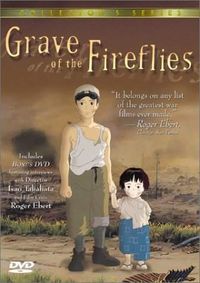
-
Title: Grave of the Fireflies Live Action (Japanese Movie)
- Also Known As: Hotaru no Haka
- Casts: Akemi Yamaguchi, Ayano Shiraishi, Tsutomu Tatsumi, Yoshiko Shinohara
- English Subs: Yes
- Ost: N/A
-
Synopsis/Summary/Review:
Based on an autobiography by Akiyuki Nosaka, the film, set during the bombing of Japan in --of all times-- World War II, centers on Seita, a loving, headstrong Navy soldier's son and his innocent little sister, Setsuko. Their fatal struggle for survival begins right at the start, when both are bombed out of house and home by American B-29s. Mom is seriously wounded and found wrapped in bandages at a hospital, where she dies shortly after. The children move to Nishinomiya to stay with their aunt. Auntie, a cold, bitter, self-serving woman, has no patience with Seita or Setsuko, especially when they would rather chase after fireflies at moonlight, play by the beach, or lounge around the house instead of helping out. After butting heads with Auntie long enough, the children decide to run away, setting up home in an abandoned cave by the lake. Both try by all means to live off of vegetables or whatever food they can afford to trade and/or steal, to no avail....
The outcome of the story is actually showcased at the opening of the movie, where we see a ghostly specter of Seita watching a more malnourished version of himself die a painful, lonely death at a train station. Indeed, as we see how these events came to pass, we find ourselves rooting for Seita and Setsuko to find a way to stay alive, but alas, it is not to be, given Seita's stubborn pride. The overall tone of the movie is of a very tragic nature--even such lighthearted moments as the aforementioned sequences involving Seita and Setsuko playing around the house or gathering fireflies as lights for their cave are all tainted with a touch of sadness, for we know that these brief scenes of happiness will not last.
Who is to blame for the plight of these children? The movie never addresses this question to the audience, nor does it really care to. It would be easy for director Isao Takahata to make this an anti-American movie, but he does better than that. Instead, he aptly conveys that war can spell serious--and deadly--consequences for victims. He also eschews casting any character as a hero or villain, and instead makes this a very human story, with no clear-cut "good" or "bad" characters. The aunt, for example, is not evil; she is merely an angry, desperate woman who is only struggling to survive just as much as Seita and Setsuko are. Atrocious as her treatment of the children is, we somehow never see her as a true baddie, but a very flawed, multi-faceted human being.
Normally one would think of this kind of story as suitable for live-action, but GRAVE OF THE FIREFLIES proves that it can be told through the art of animation as well. This is no mindless showcase of gorgeous visuals--although the artistic merits of the movie are, as with Ghibli productions, sumptuous and at times breathtaking--but a display of real characters struggling with very tangible emotions. And the most amazing accomplishment about this movie is how much we grow to care for Seita and Setsuko--their inseparable bond of love and companionship is the heart and soul behind the movie.
There are long stretches of silence on the soundtrack, with music used very sparingly, yet the movie is all the more powerful for it. The most effective moment is where we hear a scratchy rendition of "Home, Sweet Home" over a montage of Setsuko playing by the shelter. It's a simplistic, sweet, yet very saddening moment that not only works in the context of the movie, but on its own as well.
I don't normally say this in my reviews, but I would definitely recommend watching this movie in its native language of Japanese for a truly powerful and memorable experience. That's not to imply, however, that the English dub is inferior; on the contrary. It is, in fact, surprisingly good, with an effective lead in J. Robert Spencer and noteworthy cameo appearances by Anime voiceover actors Veronica Taylor, Crispin Freeman, and Dan Green. Rhoda Chrosite's Setsuko is the one voice that doesn't fare so well; she sounds more like an adult pretending to be a young girl, and comes across as strained during most scenes (save for when she is sick from diarrhea). Still, for those who can't read subtitles, the dub is more than adequate (although not as high-profile as others that I've heard).
Even in a genre as multi-faceted as Japanese Anime, there are few films that literally everyone really MUST see. GRAVE OF THE FIREFLIES is one such movie.
